Oxford Studies in Philosophy of Mind Volume 3 Uriah Kriegel
Visit to download the full and correct content document: https://ebookmass.com/product/oxford-studies-in-philosophy-of-mind-volume-3-uriahkriegel/
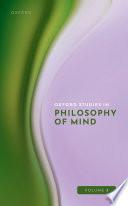
More products digital (pdf, epub, mobi) instant download maybe you interests ...
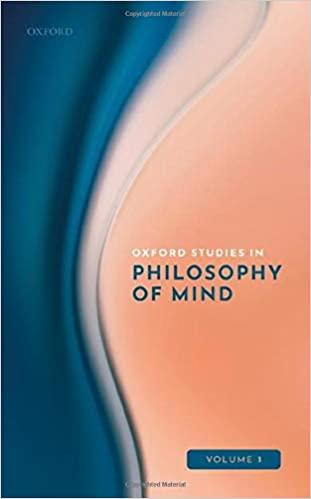
Oxford Studies in Philosophy of Mind, Volume 1 Uriah Kriegel
https://ebookmass.com/product/oxford-studies-in-philosophy-ofmind-volume-1-uriah-kriegel/

Oxford Studies in Philosophy of Language Volume 3 Lepore
https://ebookmass.com/product/oxford-studies-in-philosophy-oflanguage-volume-3-lepore/
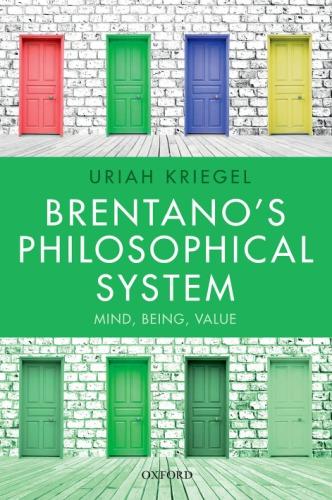
Brentano’s Philosophical System: Mind, Being, Value First Edition. Edition Uriah Kriegel
https://ebookmass.com/product/brentanos-philosophical-systemmind-being-value-first-edition-edition-uriah-kriegel/
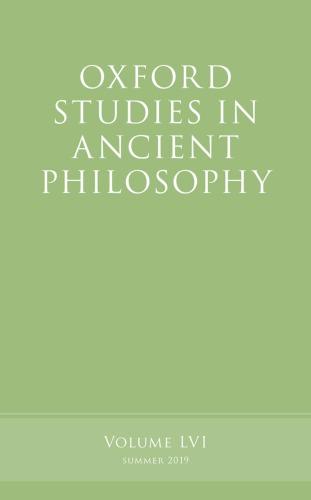
Oxford Studies in Ancient Philosophy, Volume LVI Caston
https://ebookmass.com/product/oxford-studies-in-ancientphilosophy-volume-lvi-caston/
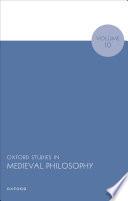
Oxford Studies in Medieval Philosophy Volume 10 Robert Pasnau
https://ebookmass.com/product/oxford-studies-in-medievalphilosophy-volume-10-robert-pasnau/

Oxford Studies in Political Philosophy, Volume 7 David
Sobel
https://ebookmass.com/product/oxford-studies-in-politicalphilosophy-volume-7-david-sobel/

Oxford Studies in Political Philosophy, Volume 4 David Sobel
https://ebookmass.com/product/oxford-studies-in-politicalphilosophy-volume-4-david-sobel/

Oxford Studies in Philosophy of Language. Volume 1 Ernie Lepore (Editor)
https://ebookmass.com/product/oxford-studies-in-philosophy-oflanguage-volume-1-ernie-lepore-editor/
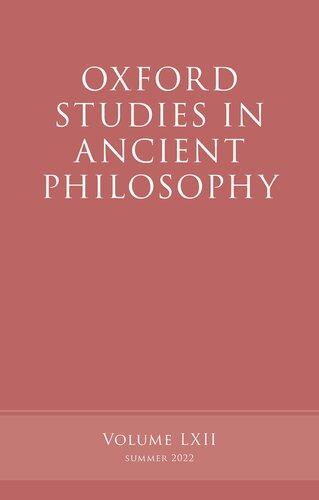
Oxford Studies in Ancient Philosophy, Volume 62 Victor Caston (Editor)
https://ebookmass.com/product/oxford-studies-in-ancientphilosophy-volume-62-victor-caston-editor/

OUP CORRECTED AUTOPAGE PROOFS – FINAL, 20/1/2021,
SPi Oxford Studies in Philosophy of Mind
Copyright © 2021. Oxford University Press USA - OSO. All rights reserved.
Oxford Studies in Philosophy of Mind Volume 1, edited by Uriah Kriegel, Oxford University Press USA - OSO,
OUP CORRECTED AUTOPAGE PROOFS – FINAL, 20/1/2021,
SPi Copyright © 2021. Oxford University Press USA - OSO. All rights reserved.
Oxford Studies in Philosophy of Mind Volume 1, edited by Uriah Kriegel, Oxford University Press USA - OSO,
OUP CORRECTED AUTOPAGE PROOFS – FINAL, 20/1/2021,
SPi Oxford Studies in Philosophy of Mind
Volume 1
Edited by URIAH KRIEGEL
Copyright © 2021. Oxford University Press USA - OSO. All rights reserved. 1
Oxford Studies in Philosophy of Mind Volume 1, edited by Uriah Kriegel, Oxford University Press USA - OSO,
OUP CORRECTED AUTOPAGE PROOFS – FINAL,
20/1/2021, SPi 3
Great Clarendon Street, Oxford, OX2 6DP,
United Kingdom
Oxford University Press is a department of the University of Oxford.
It furthers the University’s objective of excellence in research, scholarship, and education by publishing worldwide. Oxford is a registered trade mark of Oxford University Press in the UK and in certain other countries
© the several contributors 2021
The moral rights of the authors have been asserted
First Edition published in 2021
Impression: 1
All rights reserved. No part of this publication may be reproduced, stored in a retrieval system, or transmitted, in any form or by any means, without the prior permission in writing of Oxford University Press, or as expressly permitted by law, by licence or under terms agreed with the appropriate reprographics rights organization. Enquiries concerning reproduction outside the scope of the above should be sent to the Rights Department, Oxford University Press, at the address above
You must not circulate this work in any other form and you must impose this same condition on any acquirer Published in the United States of America by Oxford University Press 198 Madison Avenue, New York, NY 10016, United States of America
British Library Cataloguing in Publication Data
Data available
Library of Congress Control Number: 2020948004
ISBN 978–0–19–884585–0
DOI: 10.1093/oso/9780198845850.001.0001
Printed and bound by CPI Group (UK) Ltd, Croydon, CR0 4YY
Links to third party websites are provided by Oxford in good faith and for information only. Oxford disclaims any responsibility for the materials contained in any third party website referenced in this work.
Copyright © 2021. Oxford University Press USA - OSO. All rights reserved.
5. Experience is Knowledge
6. The Special Value of Experience
7. Ground Functionalism
8. Why I Am Not a Dualist
9. On Characterizing Metaphysical Naturalism
10. Consciousness Meets Lewisian Interpretation Theory:
A Multistage Account of Intentionality
263
Adam Pautz
Oxford Studies in Philosophy of Mind Volume 1, edited by Uriah Kriegel, Oxford University Press USA - OSO,
OUP CORRECTED AUTOPAGE PROOFS – FINAL, 20/1/2021, SPi vi
11. On Being Internally the Same
315
Matthew Parrott and Anil Gomes
12. Relational Imperativism about Affective Valence
341
Antti Kauppinen
13. From Known to Knower: Affinity Arguments for the Mind’s Incorporeality in the Islamic World
Peter Adamson Index
Copyright © 2021. Oxford University Press USA - OSO. All rights reserved.
Oxford Studies in Philosophy of Mind Volume 1, edited by Uriah Kriegel, Oxford University Press USA - OSO,
OUP CORRECTED AUTOPAGE PROOFS – FINAL, 20/1/2021, SPi
Preface
This is the inaugural volume of Oxford Studies in Philosophy of Mind, a new annual publication dedicated to the philosophy of mind. Do we need another philosophy journal? It depends on what “need” means, but Oxford Studies in Philosophy of Mind will have certain unique features that separate it from other journals.
First, each volume will combine invited articles and articles selected from submissions. Writing a philosophy paper often involves a familiar tradeoff between rigor and control on the one hand and boldness and innovation on the other. The blind-review process notoriously biases toward the former.
The purpose of invited articles is to offer contributors the freedom to fashion their own optimum point for this tradeoff. At the same time, the purpose of allowing submissions to the jorunal is to ensure access to younger scholars, perhaps from lesser-known universities or working in parts of the world of which the English-speaking world, including this journal’s editors, may be less aware.
Second, and relatedly, for most of us, when we start reading a philosophy paper, our deepest hope is not that the paper will turn out to be flawless; rather, we hope it will contain some insight that will trigger breakthroughs in our own thinking on the topic, or lure us to start thinking about it if we have not yet. Yet when we wear our referee caps we tend to automatically slide into flaw-detection
mode. Oxford Studies in Philosophy of Mind will consciously try to skew toward the insightful at the expense of the flawless.
Third, each volume of Oxford Studies in Philosophy of Mind will highlight two themes, but will also publish articles outside those themes. The purpose of the highlighted themes is to generate clusters of ideas surrounding a single topic, with the thought that the juxtaposition of perspectives on one issue will intensify interest. At the same time, the openness to submissions from outside these themes will serve two purposes. One is to allow themes that are organically gathering momentum in the philosophy-of-mind community to bubble up to the journal’s awareness. The other is to create space for talent Copyright © 2021. Oxford University Press USA - OSO. All rights reserved.
and its intellectual idiosyncrasies. Many topics that magnetize much aca-demic activity at one point start out a decade earlier as comparatively isolated spurts of ideas, typically by younger scholars.
Oxford Studies in Philosophy of Mind Volume 1, edited by Uriah Kriegel, Oxford University Press USA - OSO,
OUP CORRECTED AUTOPAGE PROOFS – FINAL, 20/1/2021, SPi viii
Fourth, the philosophy of mind has for at least half a century been torn between a traditional, armchair-led approach and a naturalistic, empirically driven approach. The most prestigious general philosophy journals tend to favor the traditional approach, while journals dedicated to the philosophy of mind, such as Mind & Language and Philosophical Psychology, tend to favor the naturalistic approach. Meanwhile, the history of philosophy of mind gets no play in philosophy-of-mind-dedicated journals, and is published mostly in history-of-philosophy journals. Oxford Studies in Philosophy of Mind will publish work from all three sectors: armchair philosophy of mind,
empirically driven philosophy of mind, and history of philosophy of mind.
Fifth, as far as invited contributions are concerned, Oxford Studies in Philosophy of Mind will observe a strict gender balance, with exactly half of the invitees being women and half men. It does not control, of course, the ultimate delivery of manuscripts by the invitees, nor the quantity and quality of submissions from each gender. (This combination of factors accounts for the unfortunate paucity of chapters by women in the inaugural volume.) Sixth, the processing of submissions will follow a different procedure. All submissions without exception will receive a verdict within a fortnight, pending force majeure. Anonymous referees will come into this process only at this stage, and will be involved even after a paper has been accepted for publication. The idea is to treat anonymous input, by carefully selected referees, as a means to improve a paper rather than a way to push authors in directions they are not intrinsically interested in.
Seventh, the journal is paired with an annual conference, hosted by Rice University’s School of Humanities, featuring a combination of forthcoming and prospective papers. Just like anonymous review, presentation to a wide audience of specialists can be invaluable in improving a paper; this is one more tool to push articles appearing in Oxford Studies in Philosophy of Mind toward excellence.
We hope that these peculiarities of Oxford Studies in Philosophy of Mind will result in an exciting publication that will be of interest to all parts of the philosophy-of-mind community and beyond. In this inaugural volume, the two highlighted themes are “the value of consciousness” and “naturalism and physicalism,” while four articles concern issues outside these two themes.
The first theme—the value of consciousness—garnered more attention Copyright © 2021. Oxford University Press USA - OSO. All rights reserved.
among submissions, and six of the volume’s thirteen chapters concern it. It features a long foundational article by a seminal thinker on this topic, Charles Siewert; a defense, by Roger Crisp, of the stark thesis that absolutely Oxford Studies in Philosophy of Mind Volume 1, edited by Uriah Kriegel, Oxford University Press USAOSO,
OUP CORRECTED AUTOPAGE PROOFS – FINAL,
20/1/2021,
SPi
all value is grounded in the phenomenology of pleasure and pain; a phenomenological analysis of the experience of fulfillment, which Hyunseop Kim takes to ground (when fitting) a meaningful life; an argument, developed by Diane O’Leary, that medicine is better framed not as concerned with fixing the body but rather as targeting improving one’s bodily phenomenology; and two articles, by Matt Duncan and Chris Ranalli, offering two distinct perspectives on the singular epistemic value of conscious experience (for Duncan, experience is knowledge, though knowledge-by-acquaintance rather than propositional knowledge; for Ranalli, experience provides us with an intrinsic epistemic good that goes beyond truth, namely cognitive contact with reality).
Regarding the second theme—naturalism and physicalism—the volume includes an innovative analysis of the essence of naturalism by Lok-Chi Chan, which highlights the role of contingent historical paths in what we consider intuitively as “naturalistically kosher,” as well as two important articles on physicalism by Jonathan Schaffer and Karen Bennett: Schaffer leverages the notion of ground to generate a twentieth-century version of functionalism, Bennett develops a new, explanatory argument against dualism.
Three other chapters in the volume bundle somewhat organically around the issue of content: Anil Gomes and Matthew Parrott seek a
workable way to draw the line between internalism and externalism about content, Antti Kauppinen offers a novel account of the intentionality of pain, and Adam Pautz tries to generate a total theory of content from the combination of phenomenal intentionality and Lewis’s theory of interpretation. The last chapter in the volume is by Peter Adamson and is historical, examining the role of certain dualist arguments in medieval Islamic philosophy.
Copyright © 2021. Oxford University Press USA - OSO. All rights reserved.
Oxford Studies in Philosophy of Mind Volume 1, edited by Uriah Kriegel, Oxford University Press USA - OSO,
OUP CORRECTED AUTOPAGE PROOFS – FINAL, 20/1/2021,
SPi Copyright © 2021. Oxford University Press USA - OSO. All rights reserved.
Oxford Studies in Philosophy of Mind Volume 1, edited by Uriah Kriegel, Oxford University Press USA - OSO,
OUP CORRECTED AUTOPAGE PROOFS – FINAL, 20/1/2021, SPi
List of Contributors
Peter Adamson Ludwig-Maximilian University of Munich Karen Bennett Rutgers University
Lok-Chi Chan National Taiwan University
Roger Crisp St Anne’s College, University of Oxford Matt Duncan Rhode Island College
Anil Gomes Trinity College, University of Oxford Antti Kauppinen University of Helsinki
Hyunseop Kim Seoul National University
Diane O’Leary Western University
Matthew Parrott St Hilda’s College, University of Oxford Adam Pautz Brown University
Chris Ranalli Vreij Universiteit Amsterdam
Jonathan Schaffer Rutgers University
Charles Siewert Rice University
Copyright © 2021. Oxford University Press USA - OSO. All rights reserved.
Oxford Studies in Philosophy of Mind Volume 1, edited by Uriah Kriegel, Oxford University Press USA - OSO,
OUP CORRECTED AUTOPAGE PROOFS – FINAL, 20/1/2021, SPi Copyright © 2021. Oxford University Press USA - OSO. All rights reserved.
Oxford Studies in Philosophy of Mind Volume 1, edited by Uriah Kriegel, Oxford University Press USA - OSO,
OUP CORRECTED AUTOPAGE PROOFS – FINAL, 20/1/2021, SPi
T H E V A L U E O F C O N S C I O U S N E S S
Copyright © 2021. Oxford University Press USA - OSO. All rights reserved.
Oxford Studies in Philosophy of Mind Volume 1, edited by Uriah Kriegel, Oxford University Press USA - OSO,
OUP CORRECTED AUTOPAGE PROOFS – FINAL, 20/1/2021, SPi Copyright © 2021. Oxford University Press USA - OSO. All rights reserved.
Oxford Studies in Philosophy of Mind Volume 1, edited by Uriah Kriegel, Oxford University Press USA - OSO,
OUP CORRECTED AUTOPAGE PROOFS – FINAL, 20/1/2021, SPi
1
Consciousness
Value, Concern, Respect
Charles Siewert
1. What Good Does Experience Do Us?
More specifically: does it bring a value of its own to us? Is it good for us in its own right? I should be clear right off: I’m not asking what good we get just from having some experience or other (no matter what kind). I am happy to concede some experiences do us no good at all.¹ But if that’s so, you may think the answer all too obvious. “So you’re asking whether there is some experience that’s nice to have just in itself? Sure, there is. For example: tasting chocolate—that’s one—or feeling the relief of taking off my shoes, that’s another. Next question!”
But bear with me. What I want is not just to secure acknowledgement that there is some type of experience intuitively good “in itself” for us to have.
I want to clarify what it means to say experience has this sort of value, and by doing so lead us to find it—not just in this or that obvious case of sensory pleasure or relief—but in forms of experience that pervade our lives. I then want to show how to use this recognition to place experience at the heart of what makes our lives worth living to us. And this I want to do, without discounting our desire that we not merely have experience, but that it reveal to us the world beyond itself and engage us with others. Finally, I want to show how it can figure fundamentally in our concern and respect for each other, and in the irreplaceable value we accord a person’s life. Carrying out this agenda fully calls for a more elaborate treatment than I can now provide.
But I do aim here to make enough of a case to merit serious consideration and inspire discussion.
Copyright © 2021. Oxford University Press USA - OSO. All rights reserved.
¹ Thus I am in basic agreement with Lee’s (2018) position (though he there takes my earlier work to maintain the contrary view).
OUP CORRECTED AUTOPAGE PROOFS – FINAL, 20/1/2021, SPi 4
2. What I Mean by “Experience”
I use the word “experience” to pick out what otherwise might be called a
“state of consciousness”—what is sometimes marked by the qualification subjective experience. And I will be drawing on a fairly liberal view of what that encompasses. I realize the conception I employ would not be granted by all. However, there just is no standard view of what consciousness is, and what forms it takes,
both free of controversy and meaty enough to help us deal extensively with questions about its value. So it won’t do to discuss these matters without being upfront about one’s starting points, even if I must here offload a detailed defense of mine to other ventures, past and future.
The use I will make of the word “experience” is to be distinguished from others that are common. If someone says something was “an experience” for them, we might ordinarily take them just to mean it was something they were affected by in a way likely to seem remarkable or salient. For example, you may describe either an airplane flight or meeting your in-laws as “an experience” in this sense. But I am using the term “experience” for states of consciousness—and I would not put plane trips or in-law encounters in that category. Note, however, that the “salient ways of being affected” sense of
“experience” does lead to the other, consciousness sense. For the ways of being affected we typically find salient include what I’d call subjective experiences. For example: your feeling as you did when the plane suddenly lost altitude, or when your in-laws asked about your religion. And these feelings are experiences in the “subjective,” and not just the “affected-by”
sense. What makes that so? I would say: these “experiences,” these feelings, coincide with your feeling them—that is, with your experiencing them.
There’s a sense in which you “experience” a feeling just in case you feel it, and the feeling itself is nothing apart from experiencing/feeling it. (By contrast: neither the airplane flight nor the in-law encounter coincides with someone’s experiencing it, in any sense.)
Attention to what you feel when you feel pain, nausea, elation, anxiety, fatigue, giddiness, restlessness, and so on, provides a good
place to start in clarifying what a “subjective experience” is. But the category is not confined to states naturally described as “feelings that you feel.” For when something looks to me located, colored, lit in a certain way, when it sounds, tastes, smells somehow to me, or when an object feels to me somehow (slippery, bumpy, Copyright © 2021. Oxford University Press USA - OSO. All rights reserved. smooth, rough)—I also experience these appearances and feelings in this “coinciding” sense, even if it would be odd to say I “feel” them. For example, how I experience the visual appearance of a word on this page alters,
OUP CORRECTED AUTOPAGE PROOFS – FINAL,
20/1/2021, SPi : , , 5
depending on whether I am looking right at it or at the word just next to it.
This is not just to say I am differently affected by its looking to me as it does: for there’s a difference in how I experience the appearance that coincides with (and isn’t an effect of) its looking to me as it does. This looking, this visual appearing, is also then a “subjective experience.”
I follow a widespread practice in saying that states conscious in this sense are states with “phenomenal character.” How your feelings feel to you, and more generally, how your experiences are experienced by you—that constitutes their “phenomenal” (or “subjective”) character. I will also speak of “phenomenal features” in this context as features you have just when you experience experiences in this “coinciding” and not just
“affected-by” sense.
And I take a conscious state/experience just to be an instance of a phenomenal feature.
I also endorse the widespread notion that for a state to be “subjectively experienced” or “phenomenally conscious” is for there to be “something it’s like” for one to be in it, in a certain sense. For instance, my tasting durian fruit is a subjective experience inasmuch as there is something it’s like for me to taste durian. What is the relevant, “conscious-marking” sense of this phrase? I regard two points as essential.
(1)
When I wonder, “What would it be like for me to taste durian?,” I want to understand what it would be for me to taste it, and to understand this in the way I could claim to acquire through tasting it myself, and could seek to have by trying to imagine tasting it. Thus to say there is “something that it’s like for someone” to have a feature in the relevant sense is to say that it is suitable for you to claim or desire to understand what it is for them to have it in a way that is found or sought in “taking up the subject’s point of view.” To say the understanding is found or sought through “taking up the subject’s point of view” means: it is found in self-attribution of the feature, or sought in imagining having it. Where what it is to have a feature is suited for the type of understanding or curiosity that is, in this sense, “subjective,” there is something it’s like for its possessor to have it.
(2)
Something is a phenomenal feature (a feature whose instances are experiences or conscious states) just in case there is unconditionally something it’s like for one to have it the sense just explained. Consider: there may Copyright © 2021. Oxford University Press USA - OSO. All rights reserved.
sometimes be something it’s like for someone or something to eat durian—
but not unconditionally. For there might be a durian-eater for whom there was nothing that was like. Maybe this is the case with caterpillars that infest
OUP CORRECTED AUTOPAGE PROOFS – FINAL, 20/1/2021, SPi 6
durian orchards, for example. (That is, maybe their ingestion of durian offers nothing for subjective understanding or curiosity to target.) By contrast, there is always something it’s like for one to taste durian—no matter who or what tastes it, or when they do so. That’s why tasting durian is (but eating durian is not) a phenomenal feature.
So, there are features there is unconditionally something it’s like for one to have. This, on my account, means features whose possession is unconditionally suited for subjective understanding or curiosity. Those are the phenomenal ones—and their instances are conscious states, subjective experiences.
By appeal to this conception, we have another way of explaining what’s meant by “phenomenal character.” Experiences so understood differ in phenomenal character just when they differ with respect to what it’s like to have them. And that means they differ with respect to what makes their possession suited for a subjective understanding or curiosity. This aligns with the previous account of phenomenal character: for such states differ with respect to what it’s like to have them just when they differ in how they are subjectively experienced.
I have so far illustrated subjective experience with examples of sensory (e.g., visual) appearances, and of feelings. But I will assume a richer conception of what all subjective character includes or
encompasses than this makes clear. So, for example, where visual experience is concerned, I will take it that we subjectively experience not just “color sensations,” but visual appearances of depth and object constancy, which make it possible for the location of things in our surroundings to become apparent to us: we experience “locational appearances.” Moreover, the character of my experience not only makes apparent to me where things are, it makes what they are apparent to me by making them “appear recognizable” to me as of this or that kind. What it’s like for something to “look recognizable to me as a hat,”
for example, differs from what it’s like for something (perhaps the same thing) to “look recognizable to me as a basket.”²
As I see this, something may look recognizable to someone as an F without their being fully competent in using the concept of an F. I do also think, however, that when, on some occasion, I understand a phrase in certain way (as I may in different ways understand the expression “He is a man of many hats”), how I understand the phrase is not removable from how Copyright © 2021. Oxford University Press USA - OSO. All rights reserved.
² For more on my conception of “recognitional appearances,” see Siewert 2019.
OUP CORRECTED AUTOPAGE PROOFS – FINAL, 20/1/2021,
SPi : , , 7
I experience the episode of thought or understanding. (Think of what it’s like for you to switch understanding of this and other ambiguous phrases.) There is, on my “inclusive” view, no sense in which we can hold constant what it’s like for us to have the experiences of understanding had in thinking, speaking, reading, and listening, while occurrent understanding is itself utterly switched
off, or substantially switched around. Conceptual activity is included in the character of our ordinary experience.
I would argue further that what are sometimes termed differences in thought “mode” or “attitude” are inherent to the phenomenal character of cognitive experience. Consider: there is something it’s like to “have something to say” in the midst of conversation—and to understand various ways of completing or continuing your part in a dialogue as constituting “saying what you had to say”—even if you did not (as near as you can tell) form a prior intention to say that very thing. For example, think of what it’s like for you when you pause to find the right way to express what you have to say, and someone else jumps in with a suggestion. You are in a position to judge (as they are not) whether that was an apt way to finish, to complete what you started to say, so as to constitute saying what you had to say, though you have no awareness of a prior intention to say it whose satisfaction dictates this determination. What it is for us to express ourselves in this manner (with or without assistance) is suited for subjective understanding in the sense that implies subjective experience. And this, I maintain, makes attitude inherent to the phenomenal character of understanding. For what it is to say (or realize someone else has said) what you had to say about something constitutes a “way of understanding what is said” that also can’t be extracted from experience while leaving its character intact. And this isn’t just a matter of what you took the words to mean. It’s a matter of what you are doing with them: whether or not you are endorsing what is said, and if you are endorsing it, whether this is merely agreeing with a proposal, or whether it constitutes a genuine case of self-expression.³
Let me mention just one more respect in which mine is a relatively rich or
“inclusive” conception of experience. Think of what it’s like for you when you have some affective experience in connection with a desire’s satisfaction or dissatisfaction. For example, you feel some
satisfaction in my cheerful and prompt compliance with your request to pass the salt. Or you feel dissatisfied Copyright © 2021. Oxford University Press USA - OSO. All rights reserved.
³ For more on my conception of the experience of self-expression, the inclusion of understanding in experience, and the issue of “cognitive phenomenology” generally, see Siewert (2020).
Oxford Studies in Philosophy of Mind Volume 1, edited by Uriah Kriegel, Oxford University Press USA - OSO,
OUP CORRECTED AUTOPAGE PROOFS – FINAL,
20/1/2021, SPi 8
that I ignore you. I regard these two categories—of affective satisfaction and dissatisfaction—as diversely manifested in the subjective character of experience, as follows:
Affective Satisfaction:
subjectively experiencing or feeling joy, pleasure, delight, or comfort; feeling glad, gratified, relaxed, or relieved; experiencing enjoyment of, or affection for, something or someone.
Affective Dissatisfaction:
feeling bothered, annoyed, irritated, uncomfortable, frustrated, distressed, disgruntled, or disturbed; experiencing revulsion, discomfort, or suffering.
To be clear, I would include in subjective experience not only such “affective states” as these, but also experiences of merely imagining or anticipating (dis)satisfaction—and further, affects corresponding to no definite desire whose (dis)satisfaction is experienced, imagined,
or anticipated—for example, feeling silly, irritable, gloomy, or lost in romantic infatuation.
To summarize, on my conception, ordinary human experience brings with it a substantial sort of mind. For the right sort of consciousness —
experience with the right phenomenal character, a kind that our own experience ordinarily has—entails the possession of highly various locational, recognitional, conceptual-attitudinal, and affective experience. And having the capacity for this experience suffices for having a mind whose possessor has highly various and complex abilities to perceive its surroundings, to recognize what it’s in them, to think about them, and to care what they offer. This is the view of what consciousness is, and what it can bring with it, on which I will draw.
3. What I Mean by “Intrinsic Benefit”
Let me now explain what I mean by saying some experience has for you a
“value of its own”—or, to put it yet another way—that it has some has
“intrinsic value for you.” By saying this I mean to say first, that having it benefits you (it is better for you to have it than lack it)— and second, that this benefit is not due solely to its affording you some other feature(s) you’re better off having than not. This means that there are some phenomenal Copyright © 2021. Oxford University Press USA - OSO. All rights reserved. features it has been or will be more beneficial for you to have rather than lack, and not just for some payoff in what else that brings.
Oxford Studies in Philosophy of Mind Volume 1, edited by Uriah Kriegel, Oxford University Press USA - OSO,
